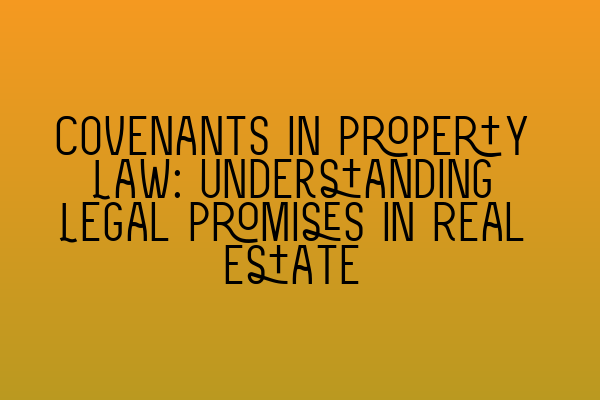Covenants in Property Law: Understanding Legal Promises in Real Estate
Welcome to the SQE Property Law & Land Law blog! In today’s post, we will be exploring the fascinating topic of covenants in property law. Covenants play a crucial role in real estate transactions, and understanding their legal implications is essential for both buyers and sellers. We’ll delve into the intricacies of covenants, highlight their significance, and provide valuable insights to help you navigate this complex area of law with confidence.
Before we plunge into the depths of covenants, let’s briefly define what they are. In property law, a covenant is a legally binding promise or agreement between two parties that pertains to the use or restriction of land. Covenants can impose obligations on the owner of the land, such as maintaining the property in a certain condition or refraining from specific activities. They can also confer certain rights upon the parties involved, further confounding their nature.
Types of Covenants
There are various types of covenants, each serving a specific purpose. It’s important to recognize these types to fully comprehend the ramifications that covenants can have on property transactions. Let’s explore some of the most common types of covenants:
- Restrictive Covenants: These covenants are designed to limit the use or development of land. They are commonly used in residential areas to preserve the character, appearance, and amenity of the neighborhood. Restrictive covenants may restrict certain activities or require the property owner to obtain prior consent for certain actions.
- Positive Covenants: Positive covenants, on the other hand, require the property owner to actively perform specific obligations. Examples include maintaining shared driveways, contributing to maintenance costs of shared facilities, or keeping the property in good repair.
- Enforceability of Covenants: In order for a covenant to be enforceable, it must satisfy certain legal requirements. These include being made in writing, benefiting the dominant land (the land that benefits from the covenant), and having the intention to bind successors to the original parties. The law surrounding the enforceability of covenants can be complex, and seeking legal advice is often advisable.
The Impact of Covenants in Property Transactions
Covenants can have a significant impact on property transactions, and failing to understand their implications can result in costly mistakes. For buyers, it’s crucial to conduct thorough due diligence to identify any existing covenants that they would be bound by post-purchase. For sellers, ensuring compliance with existing covenants is essential to avoid any potential legal disputes.
When buying a property, it’s important to carefully review the title deeds and associated documentation to identify any restrictive or positive covenants that may affect how you can use or develop the land. As a buyer, you should also consider whether any covenants will be imposed upon you once you become the owner. This is particularly important if you have plans to make significant alterations or changes to the property.
If you are a property owner seeking to sell your property, it’s crucial to ensure that you are in compliance with any covenants associated with the land. Non-compliance can result in legal action and potential financial liability. Engaging a solicitor with expertise in property law can help you navigate this complex process and mitigate any risks associated with covenants.
Seeking Professional Advice
When dealing with covenants in property transactions, seeking professional advice is highly recommended. An experienced solicitor specializing in property law can guide you through the complexities of covenants, ensuring that you understand your rights and obligations. They can help you identify any potential pitfalls and provide you with strategic solutions tailored to your specific circumstances.
At SQE Property Law & Land Law, we have a dedicated team of solicitors well-versed in all aspects of property law, including covenants. Our expertise, combined with our commitment to providing exceptional client service, makes us the ideal partner for all your property law needs.
For more information on property law topics, check out our related articles:
- Updates in UK Property Laws: Key Changes and Implications
- Legal challenges in property transactions: A comprehensive guide
- Navigating Lease Laws in the UK: Essential Guidelines for Tenants and Landlords
- Dominate Property Law Questions: Avoiding Common Pitfalls
- Land Law Revision Tips: Ace Your Exam Preparation
Thank you for reading our blog post on covenants in property law. We hope you found this information insightful. Stay tuned for more informative articles from SQE Property Law & Land Law!
